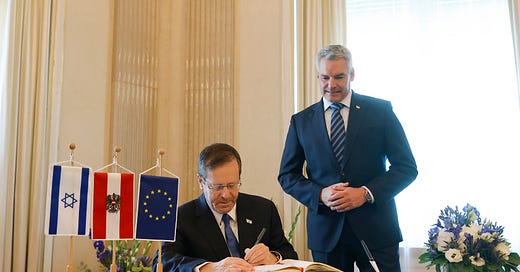Austria And Israel From Kreisky To Kurz
Austrian foreign policy towards Israel has undergone a complete transformation over the past 40 years

Servus!
Forty years ago, a hostage situation brought about a crisis in relations between Austria and Israel. On September 28, 1973, two Palestinian terrorists hijacked a train near Marchegg on Austria’s border with Czechoslovakia and took four Soviet Jewish émigrés captive. The hijackers issued an ultimatum to the Austrian government: close a transit camp for Soviet Jews at Schloss Schönau or we’ll kill the hostages. Chancellor Bruno Kreisky acquiesced, the hostages were freed, and the terrorists given safe passage to Libya.
Israeli prime minister Golda Meir was opposed to Schönau’s closure but failed to change Kreisky’s mind during a two-hour meeting in the latter’s office in Vienna. Upon her return to Israel, she famously remarked to journalists that Kreisky “didn’t even offer me a glass of water,” words which wounded the typically generous host. Closing Schönau was a popular move among Austrians but destroyed Kreisky’s reputation in Israel in spite of the fact that Austria remained a transit land for Jews fleeing the Soviet Union well into the 1980s.
Today, chancellor Karl Nehammer is in Israel, meeting with president Isaac Herzog, prime minister Benjamin Netanyahu, and the families of Austro-Israeli hostages taken by Hamas. As I began to say in last week’s newsletter, Austrian foreign policy vis-à-vis Israel has undergone a complete transformation since the Schönau ultimatum. Kreisky, chancellor from 1970 to 1983, was not only a vociferous critic of Israel but a friend of the Palestinian cause. He had good working relations with Arab leaders including Yasser Arafat and recognized the Palestine Liberation Organization (PLO). In Kreisky, Israel, and Jewish Identity, Daniel Aschheim writes Kreisky harbored dreams of being a peacemaker in the Middle East and also used criticism of Israel to draw the antisemitic Austrian public’s attention away from the fact that he was Jewish.
Schönau was not the only such low moment in Austro-Israeli relations during the Kreisky era. On August 29, 1981, two terrorists from the Abu Nidal Organization launched an attack on the Stadttempel, the central synagogue in Vienna’s first district, during a bar mitzvah service. Two people were killed and 18 others injured. It was the second terrorist incident at the synagogue in three years. After the 1981 attack, Kreisky appeared to lay the blame for it at Israel’s door, citing an “intransigent attitude towards the Palestinians” on the part of Israeli prime minister Menachem Begin as the cause.
The shift in Austro-Israeli relations only began after Kreisky had left office. In 1991, chancellor Franz Vranitzky recognized Austrian co-responsibility for Nazi crimes. This hinge moment—plus the start of the Israeli-Palestinian peace process in Madrid in 1991, Israeli prime minister Yitzhak Rabin’s election in 1992, and the end of Kurt Waldheim’s presidency of Austria that same year—laid the groundwork for Vranitzky’s visit to Israel in June 1993, the first by an Austrian chancellor. He laid a wreath at Yad Vashem and in a speech in Jerusalem apologized to the survivors of the Holocaust and asked forgiveness of the descendants of victims.
In spite of various changes in government both in Vienna and Jerusalem over the past five years, bilateral relations are better and closer than ever. In June 2018, chancellor Sebastian Kurz declared Israel’s security a raison d’état for Austria much as it is for Germany, and in 2021, the Israeli flag was raised above the federal chancellery in an act of solidarity during an escalation in tensions between Israel and Hamas. At the same time, Austria continues to support the peace process between Israel and the PLO with a view to finalizing a two-state solution, and the country has not followed the United States’ lead in relocating its embassy to Jerusalem. His methods might have been self-undermining, but on mutual recognition and two states for two peoples, Kreisky was ahead of his time.
Bis bald!
Thank you for subscribing to the Vienna Briefing. Every recommendation helps, so if you know someone who might be interested in reading this newsletter, consider sharing it with them today.
The Vienna Briefing is a reader-supported publication made possible by your donations. If you would like to contribute to my work, think about sending me a tip via PayPal.
Kurz In Court
Former chancellor Sebastian Kurz and his chef de cabinet Bernhard Bonelli appeared in court last week to face charges of making false statements before a parliamentary investigative committee. Both men reject the allegations and the presumption of innocence applies. A third defendant, former Casinos Austria general director Bettina Glatz-Kremsner, agreed to settle and pay a €100,000 fine.
Antisemitism Spikes
In the first 13 days of the Israel-Hamas war, antisemitic incidents in Vienna increased by 300 percent compared to an average period in 2022, the Jewish Community of Vienna’s Antisemitism Reporting Office has said. On Friday night, the Israeli flag flying from the front of the Stadttempel was torn down.
Austrians Love Neutrality
69 percent of Austrians believe their country should remain neutral while only 21 percent think it should join an international military alliance. Support for Austria’s permanent neutrality has remained consistent over the past 20 years, polling shows.
The Vienna Briefing will return on November 8.



